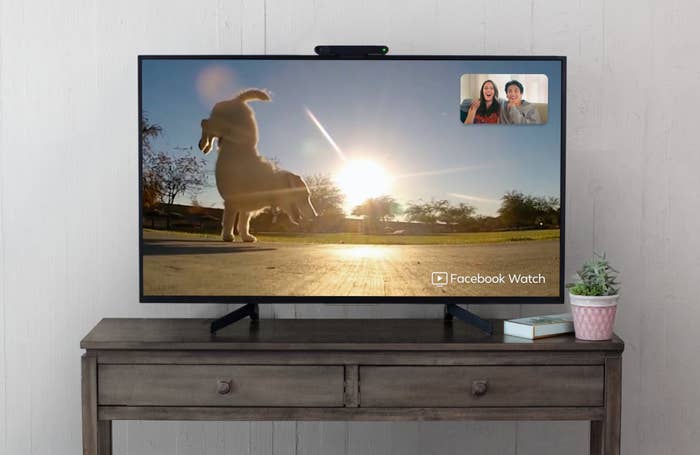One year ago, amid ongoing privacy scandals, Facebook introduced a line of always-listening, voice-activated devices called Portal. Since then, the company has struggled to reassure the public that it will protect their data. And yet it remains committed to putting Facebook hardware with cameras and microphones in customers’ homes.
Facebook announced three new products today: the 8-inch Portal Mini ($129) and 10-inch Portal ($179) — two picture frame–sized devices designed to sit on a countertop — and the Portal TV ($149), an accessory designed to sit on top of at-home televisions and let far-flung friends view Facebook Watch shows together. The devices include cameras and microphones designed specifically for video calling and have voice control via built-in Amazon Alexa software. As of today, Amazon Prime Video can also be streamed through Portal, alongside Spotify, Pandora, iHeartRadio, and other apps announced last year. Currently, Netflix and Hulu are not available through Portal or Portal TV.

Notably, the new devices have significantly lower prices than last year’s models, which ranged between $200 and $349. Facebook executives said the cuts are aimed at allowing more people to use Portal. “The most important thing for us is getting our experiences out there, and seeing how people react to them,” said Andrew Bosworth, vice president of augmented and virtual reality at Facebook, at a press event on Tuesday. “We’re not focused on the [Portal] business model right now.”
The primary function of Portal is making calls over Facebook Messenger, and for the first time, it allows users to place video and audio calls over the Facebook-owned WhatsApp service, which is end-to-end encrypted. Encryption means that only the sender and recipient can see the contents — not even WhatsApp can access the contents. Facebook Messenger works a little differently. Facebook could, if it wanted to, listen to a Messenger call because it has access to the decryption keys. But on a website dedicated to privacy on Portal, the company says it won’t eavesdrop: “Facebook doesn’t listen to, view, or keep the contents of your Portal video calls.”
Facebook plans to add even more WhatsApp capabilities to Portal. Soon, users won’t need to sign in with their Facebook accounts to use Portal. They’ll be able to use just their WhatsApp accounts, a company representative said. First-generation Portal devices will also be able to make WhatsApp calls following an upcoming software update.
Facebook Portal comes with a number of privacy features built-in, including a physical cover to block the camera lens and the ability to opt out of human review of voice recordings. But there’s no denying that some of its other capabilities are equal measures cool and creepy: For example, Portal can use your phone’s location to detect when you’re available to answer a call at home, so when you are called on Messenger, Portal rings instead of your phone. And its built-in cameras have the ability to detect people when they enter a room, and pan, widen, and zoom automatically to track them. A Facebook representative said that rather than using facial recognition, like Google’s new smart home device, Portal’s software relies on “non-biometric markers” like the color or pattern of a shirt to detect the presence of a human.
Facebook said that it wouldn’t use Portal to show advertising. But Bosworth noted that some of the data from Portal — like whether or not you use video calling frequently or whom you’re making calls to — might be used to improve Facebook’s ad targeting: “As I said last year, we’re using Facebook’s infrastructure, which means some data may inform ads people see on Facebook. But [given] the volume of Portals it’s obviously not the purpose of it, and it’s not anything that’s going to be really material for Facebook.”
Portal and Portal Mini ship on Oct. 15, and Portal TV ships on Nov. 5. The devices are now available in the US, Canada, UK, France, Italy, Spain, Australia, and New Zealand.
